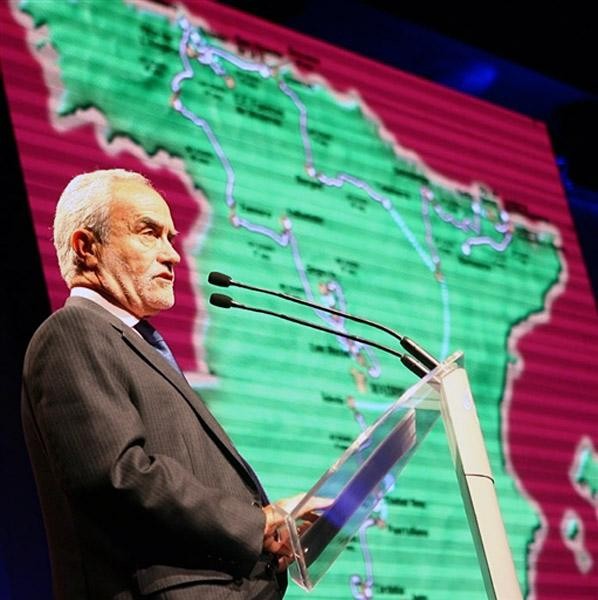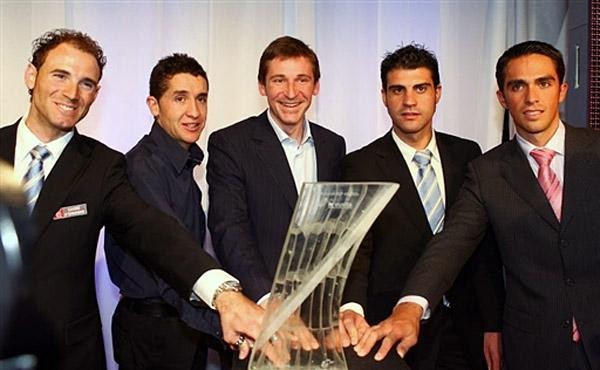Vuelta 2008: One for the mountain men
By Shane Stokes in Madrid The climbers can celebrate. A return to the gruelling Angliru, a very...


By Shane Stokes in Madrid
The climbers can celebrate. A return to the gruelling Angliru, a very tough day in the Pyrenees, an uphill time trial, a total of five summit finishes and just 40 kilometres of flat time trial for the specialists against the clock; the 2008 Vuelta a España, in truth, will be tailor-made for those who shine when it comes to battling with gravity.
Starting in Granada on August 30, 2008, and concluding in Madrid 23 days and 3,169 kilometres later, the Grand Tour will be fought on uphill terrain and should see some epic tussles by the mountain riders in the battle for the final maillot oro.
"I think the race will be for the climbers," said race director Victor Cordero to Cyclingnews. "We have four summit finishes plus the uphill time trial. We will have surprises, we have things to offer the climbers and the time trial kilometres have been really limited.
"The first time trial is just 40 kilometres. It is not the longest time trial to have been in the Vuelta and the specialists will be limited as regards what they can gain. Because of that, I believe that this is a race that is more for climbers than time trialists."
The 2008 edition of the race gets underway in Granada with a seven kilometre team time trial, almost exactly replicating the 7.2 kilometre test which kicked off the 2006 Vuelta in nearby Málaga. After three mainly flat stages, the riders cross swords in a 40 kilometre race against the clock based around Ciudad Real, then have one more leg before the first rest day. A transfer to Barbastro in the north east of the country gets three tough climbing legs underway, with the first of these – a summit finish to Andorra (Naturlandia – La Rabassa) the longest, and quite probably the hardest, of the race.
Two more mountain legs follow (including a summit finish at Pla de Beret, where defending Vuelta champion Denis Menchov won the 11th stage of the 2006 Tour de France), then three flatter stages precede another transfer and the second rest day. The climbing mayhem begins again immediately afterwards with the 199 kilometre race to the summit of the backbreaking l'Angliru and another mountain-top finish at the ski station Fuentes de Invierno.
The latest race content, interviews, features, reviews and expert buying guides, direct to your inbox!
A respite from climbing gives the sprinters and roulers four flattish stages to target – five if they get over the two early first category climbs on stage 19 – before a climatic 16 kilometre uphill time trial to the Puerto de Navacerrada. That stage will surely reveal the 2008 victor with just the final processional stage to Madrid standing in between him and the Grand Tour title.
Carlos Sastre (CSC) was one of the main animators of this year's race and the 2007 runner-up liked what he saw. "I think that this is better for the climbers," he stated at the launch at the IFEMA centre in Madrid. "There is only a small amount of time trials and in that way it is good for me…I am not a heavy rider, I have to suffer a lot not to lose time in long, flat time trials.
"This type of route is not easy but it is better for me to get something. If I do the Vuelta a España, for sure this type of course is hard and is good for a climber like myself."
There is much hype about the return of the Angliru, reckoned by many to be one of the hardest climbs in Europe. However Sastre thinks another day may be more decisive. "I think that the stage to Andorra is a more difficult stage than that to the Angliru. The stage to La Rabassa [in Andorra] is the biggest mountain stage in this Vuelta a España, it is a real mountain stage. For sure the Angliru is popular, for the media it is important, and it is a hard climb, a hard stage. But I think that in the previous times it was used, it didn't make a big difference to the final result."
To read the complete preview, including more reactions and details on the route, click here.

Laura Weislo has been with Cyclingnews since 2006 after making a switch from a career in science. As Managing Editor, she coordinates coverage for North American events and global news. As former elite-level road racer who dabbled in cyclo-cross and track, Laura has a passion for all three disciplines. When not working she likes to go camping and explore lesser traveled roads, paths and gravel tracks. Laura specialises in covering doping, anti-doping, UCI governance and performing data analysis.